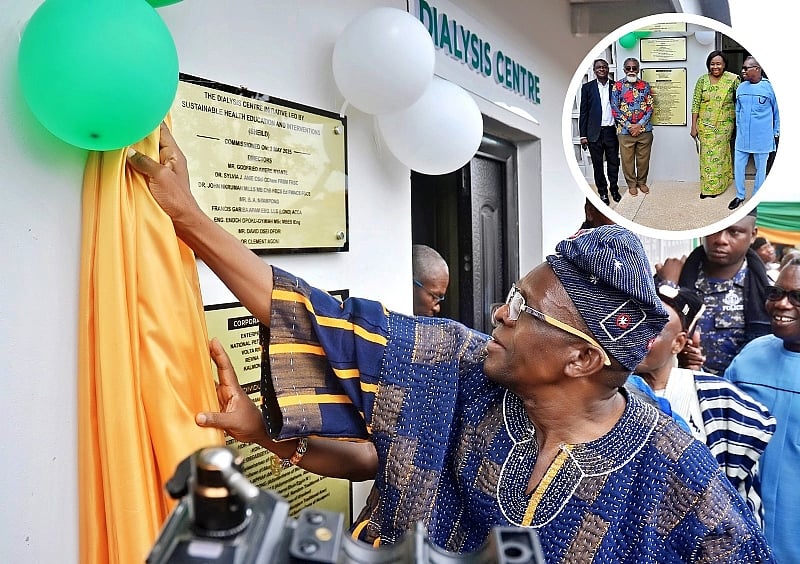A collaborative effort led by Sustainable Health Education and Interventions (SHEILD), a non-profit organization, has resulted in the establishment of a GH₵ 5.8 million kidney dialysis centre at the Tetteh Quarshie Memorial Hospital in Akuapem-Mampong, Eastern Region, Ghana. This initiative addresses a critical healthcare gap in a region where over 300,000 individuals grapple with chronic kidney disease, yet access to treatment remains severely limited. The centre, equipped with four advanced dialysis units and a comprehensive treatment facility, represents a significant stride towards improving end-stage renal failure management for the region and its surrounding areas. Key partners in this project include Enterprise Group PLC, Volta River Authority, National Petroleum Authority, Kalmoni Foundation, Revna Bioscience, and various individual sponsors, demonstrating a powerful convergence of public and private resources to tackle a pressing health concern. Enterprise Group PLC played a notable role by sponsoring the construction of a new out-house and waiting area for the facility.
The commissioning of the dialysis centre and the simultaneous launch of the Tetteh Quarshie Memorial Hospital Dialysis Fund were marked by a significant address by the Speaker of Parliament, Mr. Alban Bagbin. He emphasized the fundamental right to accessible healthcare without the burden of financial hardship, citing the World Health Organization’s estimate of 1 in 10 people globally affected by kidney disease, with 2.5 million annual deaths attributed to inadequate treatment access. Within Ghana, the statistics are equally alarming, with nearly 14% of the population, or approximately 4 million people, suffering from chronic kidney diseases. The Speaker highlighted the stark reality that only 1 in 10 affected Ghanaians can access essential dialysis due to cost and logistical barriers, further compounded by the scarcity of nephrologists and dialysis machines nationwide. He underscored the need for people-centred care, free from discrimination, and urged the hospital staff to uphold these principles in their practice. Mr. Bagbin’s personal contribution of GH₵ 50,000 to the Dialysis Fund, coupled with his pledge for continued support, exemplifies a strong commitment to alleviating the financial strain on vulnerable patients.
Dr. Sylvia Anie, a SHEILD Board Director, reiterated the urgency of the situation, pointing to the annual loss of over 4,000 lives in Ghana due to chronic kidney disease, against a backdrop of fewer than 400 dialysis machines serving the entire country. She acknowledged the pivotal role of key stakeholders, particularly the private sector, whose social responsibility made this achievement possible. Dr. Anie emphasized SHEILD’s vision of equitable and accessible healthcare, highlighting the Board of Directors’ pride in this indigenous initiative. This collaboration underscores the vital importance of public-private partnerships in addressing critical healthcare gaps and ensuring sustainable solutions.
The establishment of the dialysis centre represents a crucial step forward in kidney care provision, particularly for the Akuapem North constituency. Mr. Samuel Awuku, the Member of Parliament for the area, expressed his profound satisfaction with this development, recognizing it as a major milestone for his constituency. He commended the collaborative efforts of SHEILD, the hospital staff, the corporate and individual sponsors, as well as the traditional leaders and local community members whose contributions were instrumental in realizing this vital project. Beyond the dialysis centre itself, Mr. Awuku also appealed for public support for the construction of a footbridge linking the hospital to the opposite side of the road, aiming to enhance pedestrian safety and prevent accidents in front of the hospital.
This new dialysis centre symbolizes a significant advancement in addressing the critical need for improved kidney care in Ghana. The collaborative effort between SHEILD, corporate sponsors, and individuals has yielded a tangible result that stands to improve the lives of thousands affected by chronic kidney disease. The facility’s presence will alleviate the burden of travel and cost for many patients, allowing them to receive life-saving treatment closer to home. Furthermore, the establishment of the Tetteh Quarshie Memorial Hospital Dialysis Fund provides a mechanism for ongoing financial support to ensure the long-term sustainability of the centre and its ability to serve vulnerable populations. This initiative serves as a testament to the power of partnerships and community engagement in driving positive change within the healthcare landscape.
The impact of this dialysis centre extends beyond the immediate provision of treatment. It serves as a beacon of hope for individuals struggling with chronic kidney disease, offering them a renewed chance at life and improved quality of living. The accessibility of this centre will significantly reduce the financial and logistical barriers that previously prevented many from seeking the care they desperately needed. Moreover, the collaborative nature of this project highlights the potential for successful public-private partnerships in addressing critical healthcare challenges. This model of collaborative engagement can serve as an inspiration for future initiatives aimed at improving healthcare access and outcomes across Ghana and beyond. The long-term success of this project will depend on continued support from stakeholders and the effective management of resources to ensure sustainable operation. The construction of the proposed footbridge will further enhance the safety and accessibility of the hospital for the community it serves.


